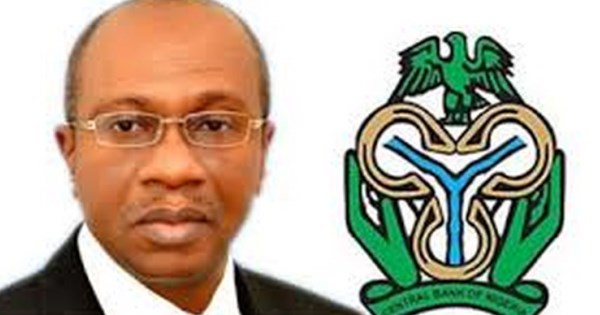E-Financial
Emefiele and the Burden of a Prophet

By Jackson Ugbechie
Dateline June 2015: Godwin Emefiele, the Governor of Central Bank of Nigeria (CBN), banned importation of 41 items which the apex bank classified as ‘not valid for forex’.

Mr. Godwin Emefiele, CBN governor
These items ranged from consumables like rice, poultry products, vegetables and processed vegetable products to building materials like cement, roofing sheets, etc.
The aim was to encourage local manufacture of these items, all of which can be produced locally. The other objective of the ban was to ease pressure on the nation’s foreign reserves. Crude oil (the major source of forex) was beginning to lose its allure in pricing. Simply put: national income (inflow) was shrinking perilously.
Today, by benefit of hindsight, it could be appropriately said that Emefiele was a prophet who saw tomorrow and quickly rallied his people to prepare for the impending storm.
Not long afterwards, the real storm came bearing down on global economies. Nigeria and other nations with huge reliance on crude oil revenues took a heavy shellacking from the storm.
Crude oil prices took a dip. From a mere dip to a free fall until it bottomed out at $27.67 in 2016.
Fast-forward 2020. Oil price is still low. Recovery has been sluggish, accentuated by the global Covid-19 pandemic. Nigeria with a population of about 200 million, low export, heavy import-dependent economy and a lifestyle that borders on flamboyance has been much hobbled by the oil price drop.
The naira is still under pressure but it could have been worse if CBN is still funding the importation of the over 40 banned items.
It could have been more difficult defending the naira in the forex market. This is the sense in which Emefiele deserves commendation for his uncommon boldness to stop the issuance of forex for the importation of these items.
Emefiele’s foresight, vision and strong anticipatory hunch has saved Nigeria from what could have been the worst economic crisis in human history since the Great Depression.
The decision to declare over 40 items ‘not valid for forex’ must have been a difficult one to take. But great leadership is about making tough calls; taking, sometimes, unpopular decisions.
Emefiele did that at the most auspicious time. It was contrary to the wishes of the advanced economies of the West which see Nigeria as their largest, most profitable market in Africa.
A policy to encourage local manufacture and patronage of locally made goods should be music to any patriotic Nigerian.
It will encourage honing of skills, create jobs in millions, stop the drain on our external reserves and ultimately shore up the sagging strength of the nation’s primary sector.
But you don’t expect such decision to go down well with the advanced nations whose major market in Africa was about to be shut.
This explains the baleful treatise conjured by The Economist magazine to deride the CBN policy. The usually opinionated UK magazine had in the wake of the ban on importation of over 40 items published a self-serving satire on Emefiele’s efforts to save the naira.
The copiously disingenuous article in The Economist tried to denigrate the CBN policy. But that was not enough to make Emefiele change his mind. The multiple-award winning central banker, convinced that the policy was in the best interest of the county, stuck to his gun.
He was unwavering. Now, Emefiele has been proved right and The Economist wrong. Nigerians are producing the banned items from grains to roofing sheets.
No matter the cynicism from those who preach classical textbook economic theories to Nigeria but act otherwise in their native countries, the truth is that foreigners cannot love Nigeria more than Nigerians. Emefiele proved this truism by raising the red flag when he foresaw the lurking economic turbulence.
The Nigerian naira dilemma is a peculiar mess created largely by a clan of crooked Nigerian elite, it will never go away by mere application of economic theories that never worked anywhere, even in the advanced West. The Nigerian problem can only go away by the application of well-thought through policies as Emefiele did.
To better appreciate the Emefiele magic, let’s consider this scenario. In 2013 at a time when crude price was $120 per barrel what CBN received to service the forex market from petroleum inflows either from petroleum products trading, royalty, taxes, NNPC etcetera was as high as $3.3 billion in a month. By June 2014 when external reserve had dropped to about $37 billion, what the nation got had dropped to less than $2 billion. Recall that the whole crisis started in July 2014 and by March 2015 when crude price had dropped to about $48pb, the nation’s reserve had gone down to $30 billion. At that point, what was coming in as forex which the CBN will use to service the market had dropped to about $1.3bn from about $3.3 billion in just over a year.
At that time, around January/February of 2015, CBN usually funds the forex market by Monday and Wednesdays with $200 million each of the days which is $400m in a week. At that time CBN was fighting the hostile market and saying we’ll defend the naira.
The inter-bank market was defending the market with about $100million per day which is $500 million per week. If you add that to the official buffer of $400m on the part of CBN, it adds up to $900m weekly. This means that in a month Nigeria needed $3.6 billion dollars minimum to fund the forex market and by interpretation fund importation.
As the price of crude continued its free fall, monthly outflow hit $4bn against an inflow of just $1.3 or $1.5 which brought net depletion of Nigeria’s reserve on a monthly basis to about $2.5 billion. If CBN had continued the depletion of our reserve from March 2015 by $2.5 billion monthly, by now Nigeria would have zero reserve. That is the stack reality.
And this is why Nigerians should commend the boldness and farsightedness of Emefiele to place a historical and landmark ban on over 40 items. Not only has he helped to boost backward integration, the policy eased pressure on the nation’s reserve.
Obviously, Nigerians are still paying dearly for their lavish lifestyle. Statistics from the National Bureau of Statistics (NBS) shows significant importation of certain items. In the half-year (January – June) of 2019, Nigerians spent a total of N334.3 billion to import prepared foodstuffs, beverages, spirits, vinegar and tobacco. NBS says within that period Nigeria imported 21 different items with the major items including live animals, animal products, vegetable fats and oil, prepared foodstuffs, beverages, mineral products, textiles, broilers and vehicles.
Broilers, machinery and appliances form the biggest import which was estimated at N2.11 trillion. Mineral product ranked second with N1.3 trillion import in half-year 2019. Other top items on the import list include vehicles, aircraft and parts (N1.06 trillion), cement (N599 billion), metals (N386.1 billion).
In recent past before the restriction, Nigeria spent an average of $22 billion each year on food (rice, wheat, sugar, fish etc) importation. The sad fact is that all of this money go to reflate the economies of Thailand, India, China and the West.
If all of this could happen with restriction, imagine the scenario if there were no restrictions. Emefiele is indeed an unsung hero. That’s the burden of a prophet who is barely appreciated at home.
But first Nigerians must change their exotic and outlandish lifestyle. No nation builds a strong economy on importation.
_ Ugbechie, public affairs analyst, writes from Abuja.
E-Financial
Kuda Bank Teams Up with Lovers & Frnds for Inclusive Valentine’s R&B Bash

Kuda Microfinance Bank partnered with Lovers & Frnds for a Valentine’s edition event on Sunday, February 15, at Space Hub Lekki, Lagos, redefining celebrations around love, friendship, and social connections beyond romance.

Kuda Bank
The R&B-themed gathering drew couples, friend groups, and solo attendees with music sets from DJs like TGarbs, games, gift exchanges, and colour-coded tags—red for relationships, yellow for mingling singles, orange for non-minglers—to spark easy interactions.
Kuda activated a branded photo booth, merchandise giveaways, prize activities, and complimentary drinks for Premium loyalty tier customers, while vendors used Kuda Business POS terminals for seamless cashless payments.
Senior Brand Manager Emmanuel Femi-Adejobi said: “We partner with experiences matching our customers’ lifestyles in music and entertainment, creating spaces they genuinely connect with—we’ll keep supporting how they live and celebrate.”
E-Financial
CBN Cuts MPR by 50bps to 26.50% as Inflation Eases for 11th Month

Central Bank of Nigeria (CBN) has lowered its Monetary Policy Rate (MPR) by 50 basis points to 26.50 percent from 27 percent, a unanimous decision announced by Governor Olayemi Cardoso at the end of the 304th Monetary Policy Committee (MPC) meeting in Abuja on Tuesday.

CBN
Cardoso cited 11 straight months of decelerating headline inflation—reaching 15.10 percent in January 2026 per National Bureau of Statistics—as key, driven by prior tightening lags, naira stability, food supply gains, steady petroleum prices, export earnings, remittances, and balance of payments strength.
Liquidity ratio stays at 30 percent, CRR unchanged at 45 percent for commercial banks (16 percent merchant banks) and 75 percent non-TSA public deposits; standing facilities corridor now +50/-450 basis points around MPR.
The MPC retained other parameters, welcoming Executive Order 09 redirecting oil/gas revenues to the federation account for fiscal boost, last cutting rates in September 2025 after November’s hold.
E-Financial
Retiree Slams N50m Suit against over Alleged Privacy Breach, Unauthorized Accounts

Abiodun Olokunjuwon, a retired civil servant based in Ibadan has instituted a N50 million lawsuit against Moniepoint Microfinance Bank at the Oyo State High Court, alleging that the fintech company opened unauthorized bank accounts in her name without her knowledge or consent.

Filed in February 2026, the suit is among the first significant cases testing the enforcement of the Nigeria Data Protection Act 2023 against a Nigerian fintech institution.
According to the statement of claim, the plaintiff became aware of the alleged unauthorized accounts only after her legitimate bank account was restricted pursuant to a garnishee order linked to a debt she denies incurring.
The restriction reportedly prevented her from accessing funds needed for essential transactions.
The claimant alleges that Moniepoint opened two separate accounts in her name using her National Identification Number (NIN) and Bank Verification Number (BVN) without proper authorization or verification.
Following the discovery, she submitted a Data Subject Access Request (DSAR) under the NDPA 2023. Documents allegedly provided by the bank, according to the suit, revealed significant verification lapses.
The plaintiff claims the accounts were opened using falsified documents, including what she describes as a fake NIN slip and contact information unrelated to her.
She further alleges that the accounts listed a Lagos residential address where she has never lived.
The suit contends that Moniepoint failed to implement adequate identity verification and address confirmation procedures before creating and operating the accounts. It further alleges breaches of statutory obligations under the NDPA 2023, including:
- Failure to ensure personal data processed was accurate and lawfully obtained
- Failure to implement appropriate technical and organizational security measures
- Failure to prevent unauthorized or fraudulent processing of personal data
The claimant maintains that these alleged lapses resulted in serious personal and financial harm.
The plaintiff is seeking N50 million in damages for emotional distress, health complications, and disruption to her financial life.
She is also asking the court to order the permanent closure of the allegedly unauthorized accounts.
No date has been fixed for hearing on the matter.

 General News2 days ago
General News2 days agoZinox Technologies and TD Africa Forge Strategic Partnership to Revolutionize African Tech Ecosystem

 Telecom2 days ago
Telecom2 days agoUwaje Pays Tribute to Leo Stan Ekeh @70

 E-Financial2 days ago
E-Financial2 days ago$214Bn Missing, Institutions Silent: Is Accountability Dead in Nigeria?

 Telecom2 days ago
Telecom2 days agoCyber Immunity Emerges as Shield for Nigerians Amid Rising Scams

 General News2 days ago
General News2 days agoNITDA, Abia Partner on Enterprise Architecture Reform

 E-Business2 days ago
E-Business2 days agoInterswitch Partners Abia to Digitise Public Hospitals

 E-Business2 days ago
E-Business2 days agoWIEG 2026 Summit Shifts to April 22-23 for Maximum Impact

 News1 day ago
News1 day agoNITDA Urges Stronger State Partnerships as Key to Digital Economy Goals @ South-South Stakeholders Forum
























